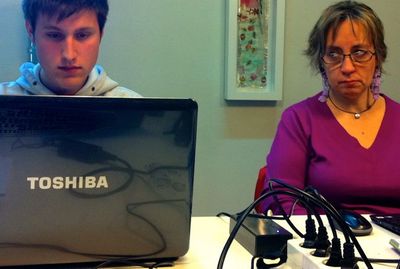Teens online: Should 'old farts' just stop being shocked?

Parents have a lot of concerns about what their teens do online, according to the new Pew study we’ve consulted this week. We’ve talked about common worries parents have, how they intervene by setting parental controls and talking with their kids, and the ways in which teens thwart their parents’ interventions and do the very things their parents fret about—talking with and meeting strangers, viewing adult material, posting questionable content and photos and potentially harming their reputations and future prospects.
One of our readers on AnnArbor.com, which syndicates OurValues.org, had this reaction: “This will only be shocking to old farts. I am a mom and was a teen when the internet became common in households. The very first thing I did was look for porn and talk to strangers online.”
This comment made me think of three possible perspectives on the whole issue of parents, teens, and online privacy. Which one of these three comes closest to your view?
1. Overblown concerns: Perhaps all the hoopla, worry and concern expressed by respondents to the Pew study are out of proportion to the real risks and dangers out there. In particular, older parents might be overly worried because they just don’t get it. The risks and dangers are overblown.
2. Thwarting parents is just part of growing up: There may be real dangers out there, but taking risks and outwitting your parents is part of growing up. It’s a natural process that all generations have gone through.
3. Real dangers and risks: The third view point is that this issue is not overblown, and while outwitting parents is great fun and part of growing up, the dangers and risks are unique because growing up takes place, in part, in the online world.
As we reflect on our discussion this week, which of these three views comes closest to your own?
Wayne Baker is a sociologist on the faculty of the University of Michigan Ross School of Business. Baker blogs daily at Our Values and can be reached at ourvaluesproject@gmail.com or on Facebook.


Comments
EyeHeartA2
Sat, Dec 8, 2012 : 12:12 p.m.
Question for the Staff at AA.com Is "Old Fart" OK for use on this site now? How about just plain "old" or just plain "fart" or do they have to be together to describe somebody? Is it only OK generically? or can I use it specifically to describe someone? Thanks.
kmgeb2000
Fri, Dec 7, 2012 : 7:17 p.m.
I have observed my 13-year-old niece dive into YouTube and return with both valuable learning experiences and digital garbage. As well as everything in between. The problem is that she lacks the knowledge to differentiate between the two. She is a sponge soaking up everything. Absent her mother looking over her shoulder 24/7 and mentoring her on the differences, I would tend to fall into the "real dangers and risks" category. In this case, "risks" would seem to be the optimal word.
tom swift jr.
Fri, Dec 7, 2012 : 5:24 p.m.
"Old Farts"??? Really, this is the headline you're running? As a senior citizen, I am offended. Had someone used a slur like that to describe an ethnic group or minority group, or a gender related group, you would never have run it. Ann Arbor.com, get your act together...... And, to be honest, Dr. Baker's articles are of little value.....
DJBudSonic
Fri, Dec 7, 2012 : 4:38 p.m.
#3 The difference between then and now, when it comes to understanding the generation gap in relation to Internet use is simple. The Internet is so chock full of every disgusting and dangerous thing you can imagine, and access to same is so easy, that, combined with our media saturated, consumer cuture, kids today have no chance of normal, leisurely development. Unless parents control access to the Internet ( difficult given the schools pervasive use) assume that your child knows about and has seen things that were normally reserved for adult audiences, medical examiners, gynocologists, and sociopaths.